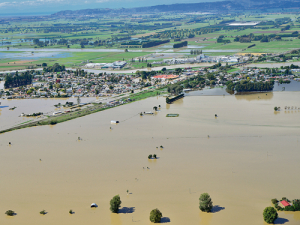Another Windfall for Fonterra Farmers, Unit Holders
Fonterra farmer shareholders and unit holders are in line for another payment in April.
 Donna and Corrie Smit’s farm under water earlier this month. Photo: Louis Klaassen, Whakatane Beacon
Donna and Corrie Smit’s farm under water earlier this month. Photo: Louis Klaassen, Whakatane Beacon
Fonterra Director and Edgecumbe farmer Donna Smit was at a Dairy Women’s Network meeting in Auckland on April 6 when she heard of the state of emergency back home.
“I found out the Rangitaiki River stopbank had burst and there was a state of emergency in Edgecumbe; immediately I drove home,” she told Dairy News.
“Corrie, my husband, had been helping families in Edgecumbe escape the floodwaters with our tractor and hay trailer. He had checked the Omeheu Canal with Bay of Plenty Regional Council; at that time the water was moving towards the sea away from our farm. He checked the canal an hour later and there was a torrent filling our farm.”
The 160ha farm remained off-limits for a week; last week the Smits were clearing fallen trees there. Flood waters have receded and builders were carrying out repairs to a farm worker’s house.
Smit says the damage is the worst they have encountered on the farm in 28 years.
“There is not a lot of silt but the paddocks with higher covers now have rotting grass and the farm looks brown with little snippets of green. Our focus is on undersowing pastures so we are set up for next season.”
The Smits milk 520 cows on the Tawa Street farm, 2km from Edgecumbe town.
The cows were shipped out in a dramatic operation. As floodwaters rose, the Smits had to quickly decide the fate of the 600 animals, including yearlings, on the farm.
“Corrie rang me to say he needed to get our cows off the farm but he didn’t know where to take them. I made a few phone calls; it was great, our friends jumped in and helped and we found places for our stock to go,’ says Donna.
He then rang saying he needed trucks -- lots of them -- 12 truck-and-trailers units to be precise.
Donna contacted their local trucking firm Heikell Transport. It took almost 12 hours to get the 600 stock off the farm; the last truck drove out in water 400mm deep.
“They were fantastic; they worked with other trucking companies and we had a truck-and-trailer unit arriving every hour as fast as we could load. [We finished] in the nick of time.
“The amazing thing was people just came to our farm and helped; it really was heart warming, they just kept coming, some with lunch; others came and helped until the job was done.”
Donna says she is proud of Corrie making the right decision early, despite being under huge pressure.
“We had to get the stock off; the water just kept rising until the breach was closed two days later. We were lucky our house was not flooded, although one of our farmhouses was flooded and a lot of our neighbours had extensive flooding damage.
“There was a bit of trouble getting the stock trucks into the Edgecumbe cordon, but common sense prevailed and the police let them in, for which we are grateful.”
She says the level of support from businesses, the community and other farmers helped them get through.
“We had excellent support from Fonterra Farm Source’s team, with Lisa Payne working tirelessly at the command centre at Wilson James’ house.
“Lisa and her team helped us find dry cow grazing for our cows; we have also had lots of support from our suppliers Ballance and FMG, and lots of friends texting to make sure we are okay.”
The yearlings are back onfarm and this week they hope to bring back some of the now dried-off cows.
Global trade has been thrown into another bout of uncertainty following the overnight ruling by US Supreme Court, striking down President Donald Trump's decision to impose additional tariffs on trading partners.
Controls on the movement of fruit and vegetables in the Auckland suburb of Mt Roskill have been lifted.
Fonterra farmer shareholders and unit holders are in line for another payment in April.
Farmers are being encouraged to take a closer look at the refrigerants running inside their on-farm systems, as international and domestic pressure continues to build on high global warming potential (GWP) 400-series refrigerants.
As expected, Fonterra has lifted its 2025-26 forecast farmgate milk price mid-point to $9.50/kgMS.
Bovonic says a return on investment study has found its automated mastitis detection technology, QuadSense, is delivering financial, labour, and animal-health benefits on New Zealand dairy farms worth an estimated $29,547 per season.
OPINION: Staying with politics, with less than nine months to go before the general elections, there’s confusion in the Labour…
OPINION: Winston Peters' tirade against the free trade deal stitched with India may not be all political posturing by the…